What is Abutment for dental implants? Procedure & Benefits
Are you considering dental implants to restore your smile? One of the critical components in this process is the abutment for dental implants. Acting as the connector between the dental implant and the final crown, the abutment plays a vital role in ensuring the stability and functionality of your restoration. In this article, we will delve into the importance of the abutment for dental implants, how it impacts your overall dental health, and what you can expect during the procedure.
What is an abutment for dental implants?
To understand what an abutment for dental implants is, we need to understand what dental implants are first. A dental implant is a prosthesis that consists of three parts: an implant body, an abutment, and a fake crown. The implant is surgically fixed into the jawbone below the gums, playing the role of root teeth. This provides a secure platform for an artificial tooth.
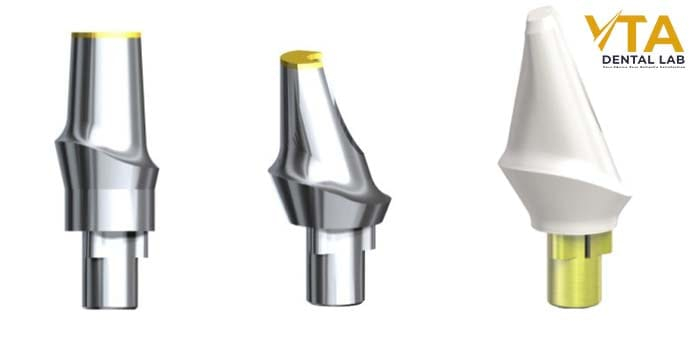
Abutments are quite simply the connector between the implant and the prosthesis
The abutment for dental implants is the connector between the implant (root teeth) and the crown (prosthesis). These are typically made out of titanium or other materials such as gold, zirconia, stainless steel, and more are also used.
When the patient is getting dental implants, the dentist will advise you on what material, procedure, and time to put an abutment on their implant. The abutment for a dental implant is placed at the same time as the implant or during a second surgery after implant placement.
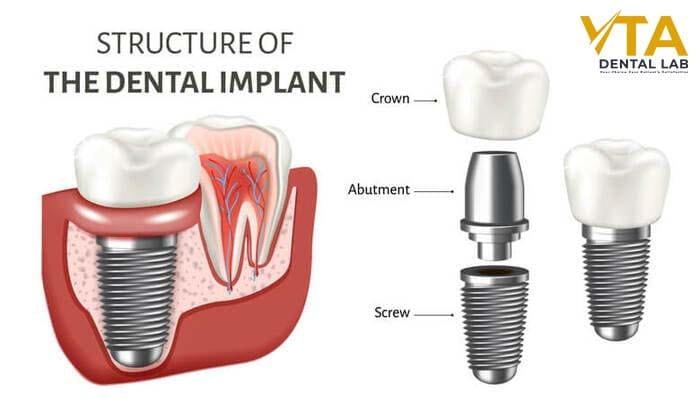
The Abutments for dental implants are made out of titanium or other materials
Types of the abutment for dental implants and their uses
Dental implant abutments are crucial components that connect the implant to a replacement tooth. Here are the main types of abutments and their uses:
Stock Abutments
Stock abutment for dental implants can also be called standard abutment. This type of abutment implant is pre-manufactured abutments, which provide a cost-saving and time-efficient solution. However, because they are not customized for individual patients, a stock abutment for dental implants may be compromised in fit and aesthetics. Generally, they are used when the implant is placed in a location with a lot of soft tissue coverage and fewer aesthetic concerns, such as a posterior region of the mouth.
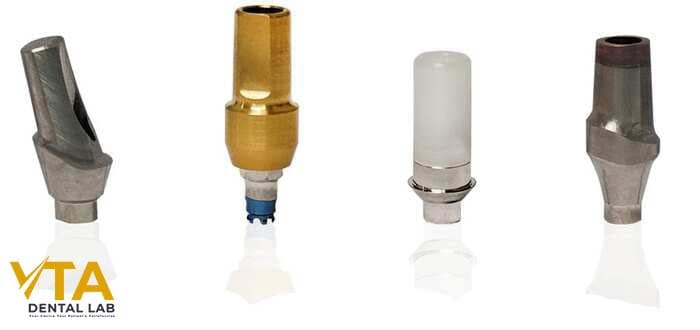
Stock Abutments suitable for situations with a less critical aesthetic
The advantages of stock abutment for dental implants are cost-effective because they are off-the-shelf options, made by dental implant companies to fit an existing implant system. Consequently, the stock abutment can be used without the required waiting time, making them more affordable than custom options.
Another thing to consider is that the stock abutment can come in a range of shapes and sizes, which can meet many requirements of the implant situation of the patient.
Custom abutments
A custom abutment for dental implants is individual fabrication to fit the gum lines and adjacent teeth. Before performing the implant, the dentist will take an impression of the implant, and surrounding tissue, ensuring the precise fit.
This customization can provide better aesthetic outcomes, especially in the arterial or visible areas of the mouth. Furthermore, custom abutments for dental implant can ability to the emergence profile in visible areas for creating a more natural look.
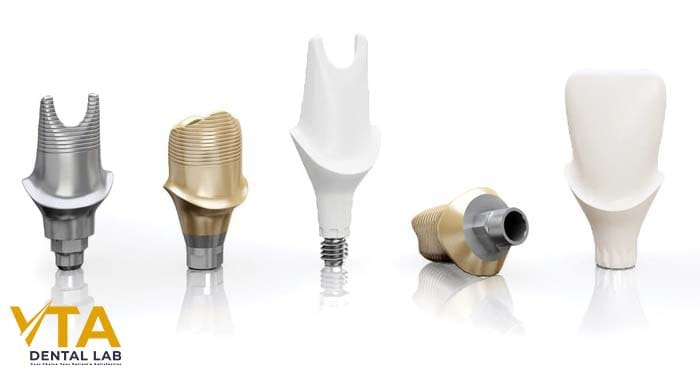
The custom abutment is tailor-made for the patient
Healing Abutments
Healing abutments known as healing caps, play a role immediately after implant surgery. After a dental implant is placed in the jawbone, a healing abutment is attached to the implant’s top. Its primary purpose is to allow the surrounding gum tissue to heal properly and form around the implant.
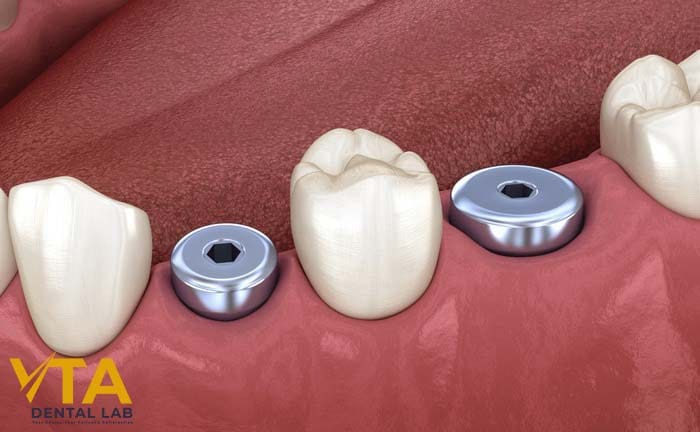
A healing abutment is a temporary abutment placed to aid the gum tissue
Healing abutments are typically used for a few weeks to a few months, depending on the individual’s healing process. They are usually made of biocompatible materials like titanium or ceramic. Once the healing process is complete, the healing abutment is removed, and a permanent crown or prosthetic tooth can be attached.
Zirconia Abutments
The Zirconia abutment for dental implants is a popular choice for patients today because of the natural appearance of the root tooth that blends with the natural dentition. They are particularly used for anterior crown placement where metal abutments can show through thin gum tissue.
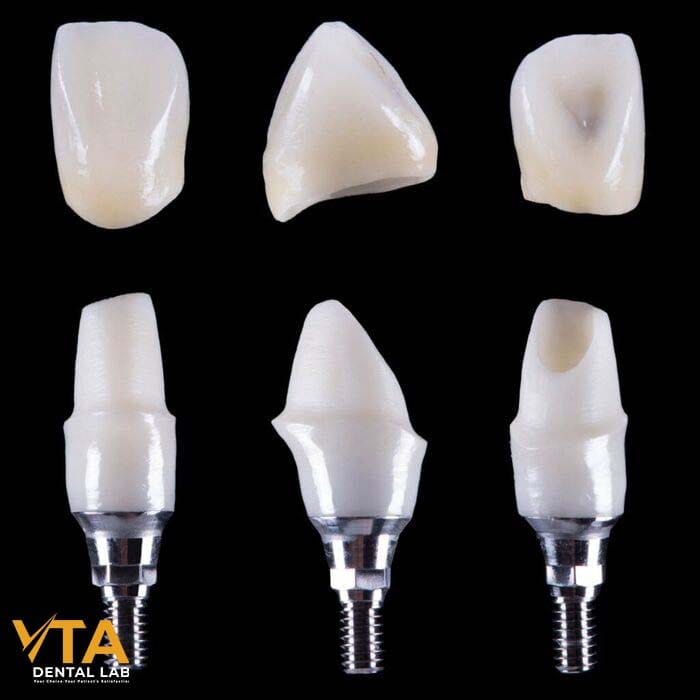
Zirconia abutments preferred in the anterior region for aesthetic purposes
A further point to discuss is that zirconia abutment for dental implants is also known for being highly biocompatible with its promotion of healthy tissue response and resistance to plaque. As a result, zirconia abutments are an excellent choice for patients who take care of gum health and appearance.
Titanium Abutments
Titanium abutment for dental implants is a material with high structural strength, good biocompatibility, and the ability to integrate with bone. This type of abutment implant is used for the posterior, where there is a lot of biting and chewing force and less concern about aesthetics. Titanium abutments are moderately priced and can be used in both stock or customized forms.
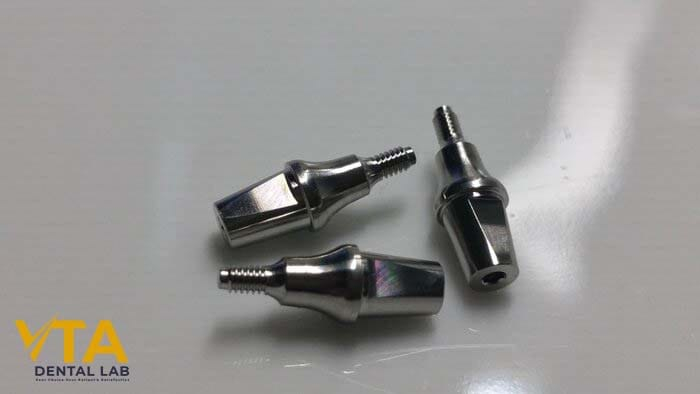
Constructed from titanium, known for its strength and durability
How Are Dental Abutments Placed?
Placing dental abutments is a key step in the dental implant process. Here’s how it typically unfolds:
Initial Consultation
The dentist assesses your oral health, including taking X-rays or 3D images of your jawbone to determine the best treatment plan.

Dentist checks oral health
Implant Placement
The dentist makes an incision in the gum to expose the jawbone and drills a small hole to place the implant, which is usually made of titanium. Then the healing abutment is attached to it. The implant is left to integrate with the bone, which can take several weeks to months.
The healing abutment for dental implants will protrude through the gum surface and remain in place while the dental implant heals. Once the implant and jawbone have fully integrated, the healing cap will be removed to access the implant.
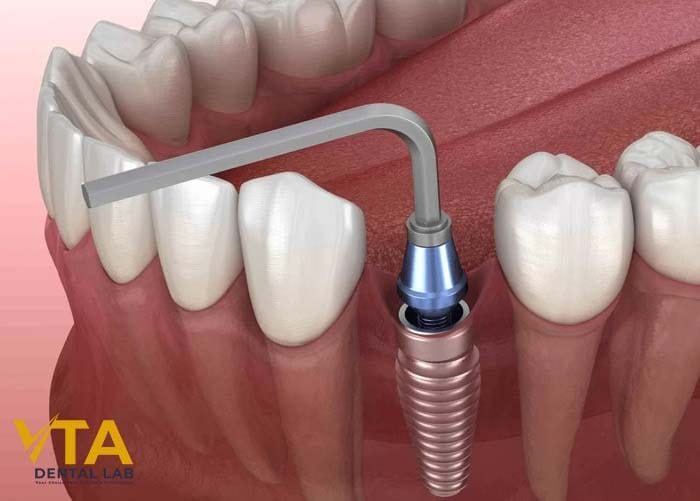
The dentist is surgically placing the dental implant into the jawbone
Depending on the implant location and the patient’s requirements, the appropriate implant abutment type will be selected. If the abutment needs to be adjusted to suit each patient’s case, the doctor will send the request to the lab for implementation.
Customized abutment for dental implants
The dental lab will receive the order from the practice and proceed to adjust the implant abutment to suit each patient. The process may take a week for adjusting the implant abutment and testing.
Final Abutment dental implant
The final abutment dental implant is sent to the practice. While the gums have healed, the dentist removes the healing abutment to place the final abutment. Once the area is healed, impressions are taken to create a custom crown that will be attached to the abutment.
Conclusion
The abutment for dental implants plays a crucial role in the restoration process. By firmly connecting the implant to the final crown, abutments not only enhance aesthetics but also ensure the overall health of the surrounding tissue, durability, and integration with the bone. Furthermore, choosing the right dental laboratory will help your dental practice optimize time and work process effectively.
VTA Dental Lab is one of the professional dental laboratories, that provides quality products and services for dental clinics. VTA Dental Lab specializes in manufacturing cosmetic and dental restorative products through its fully equipped dental laboratory.
If you are looking for a reputable dental laboratory, please contact us via Email at info@vtadentallab.com or Call our hotline at 1-714-882-4026.